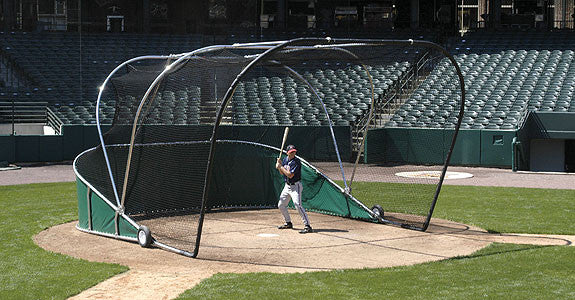I have a 9 year old that has been playing ball for 4 years and has been hitting balls pretty good. In the last two months he has moved to travel ball, and has not been hitting very well. Out of a bucket of balls thrown from 30’ he could not hit but one. He has been going to batting cages and is batting at 45 to 55 mph. ok. His swing is complete and straight with no head turning and not stepping out of box. I don’t know what to tell him any more I know he can see the ball and follow to plate. What do you thinks is the problem? Using a 29 x 19oz bat.
Thanks
Richard
--------------------------
Richard
Do some of or all of the following things.
1. Throw him balls (plastic or soft) underhand from out in front. Under hand is important and from in front is important. The drills is called front toss.
2. You throw to him after the front toss drill live so he can hit it do not worry about speed.
3. Some where along the line do a drill of taking the bat away and having him just stand there and watch the ball so he can tell if it is a ball or strike and get use to the ball coming at him and judging it.
4. Work off a stationary tee
5. Limit the pitching machine for a couple of weeks while doing the drill above then reintroduce the machine.
6. Then in about 3 weeks you hitting routine should be TEE WORK- FRONT TOSS- WATCH 10 PITCHES-15 LIVE PITCHES- THEN THE MACHINE THE REST OF THE TIME.
When you do this he sill start to hit the ball when it is pitched live/machine but you have to work on hand eye coordination first and foremost.
Coach Arnald Swift
What would you do to motivate a player that has all the opportunity to be a good player. He has a manual for pitching and doesn't even look at the workouts, has a batting cage and doesn't spend much time grooving his swing. He is going to be 15yrs. Please advise.
======================
Dear Anthony
If what you describe is true that you have a real problem it you that wants to have the boy be the player. But if he's 15 years old he's got his mind made up of what you would really like to get out of the game so my advice is to sit down with him and have him tell you what he wants and then you do it. It is always been my philosophy of my own boys and players and I've coached for them to tell me what they're willing to do and then hold them to that standard. If they tell me they don't want to play then I say okay what do you want to do, because if it isn't baseball and we need to do something else is my patent answer because we're not going to do nothing. What we do do were going to do to the best of your ability and do it right. It sounds to me like your boy only plays when you wanting to and not because he wants to.
The truth is your raising the boy not to baseball player so be willing to work with him in what he wants to do, is just my advice don't let him do nothing.
Coach Arnald Swift
Good morning Coach,
I was selected to manage a tournament/travel team of 12 year old players who are now training for our Big week long tourney and experience at Cooperstown in July. Starting this Sat nite for the next 10 weeks I landed an indoor facility for which we can have indoor workouts for 90 minutes each week....I was hoping that you could provide me with some guidance in regards to how to best utilize the 90 minutes each week or provide a possible "game plan" as to what drills, how many kids in a group and how many stations I should setup.
Your expert knowledge is greatly appreciated.
Thanks,
Coach Steve
==============================================
Dear Steve
I understand your question very much. The answer is really too long to go through here but you already have the concept of what we need to do is set up stations for hitting (soft toss, front toss, tee work, live plastic ball, live or machine pitch hitting. Hopefully you can created of hitting drills have the first half hour to 45 minutes be the hitting. Then we need to move on to fielding drills (take away the gloves and do soft grounders, put a net at first base put everybody at shortstop take grounders to have them throw into the net like it was the first baseman, spread out all over the field have them take grounders from each other and/or their coaches, learn to throw through the target and not to it- this throwing to a target in set up short hopping everybody you have to learn to throw through it). Then about 15 minutes spent some time on middle work how to approach the batter's box (think about your last bat think about the battered front of you think about the situation all those kinds of things before you reenter the batter's box, if your picture how you going to take to this guy that you faced take a look at how he stands, take a look at his first couple swings, make sure you know the situation with your batter and people on base. Did physically work on situations with runners on base when you do this you can accomplish two things in a time coaching the defense against runners and then coaching the runners to be aware of the situation. This is a big deal to have runners understand- runner on third what I do, runners at first and second what do I do runners at second only what do I do, -- they have to make a decision when the balls hit in the air, when the balls it on the ground, the line drives, past balls, anything else you can think of.
This will get them ready to go to Cooperstown, which by the way is a good experience I had the privilege of umpiring their and found it quite satisfying.
Best of luck and let me know how that all works out.
Coach Arnald Swift
Good morning Coach,
I was selected to manage a tournament/travel team of 12 year old players who are now training for our Big week long tourney and experience at Cooperstown in July 2015. Starting this Sat nite for the next 10 weeks I landed an indoor facility for which we can have indoor workouts for 90 minutes each week....I was hoping that you could provide me with some guidance in regards to how to best utilize the 90 minutes each week or provide a possible "game plan" as to what drills, how many kids in a group and how many stations I should setup.
You expert knowledge is greatly appreciated.
Thanks,
Coach Steve
========================================================
Dear Steve
I understand your question very much. The answer is really too long to go through here but you already have the concept of what we need to do is set up stations for hitting (soft toss, front toss, tee work, live plastic ball, live or machine pitch hitting. Hopefully you can created of hitting drills have the first half hour to 45 minutes be the hitting. Then we need to move on to fielding drills (take away the gloves and do soft grounders, put a net at first base put everybody at shortstop take grounders to have them throw into the net like it was the first baseman, spread out all over the field have them take grounders from each other and/or their coaches, learn to throw through the target and not to it- this throwing to a target in set up short hopping everybody you have to learn to throw through it). Then about 15 minutes spent some time on middle work how to approach the batter's box (think about your last bat think about the battered front of you think about the situation all those kinds of things before you reenter the batter's box, if your picture how you going to take to this guy that you faced take a look at how he stands, take a look at his first couple swings, make sure you know the situation with your batter and people on base. Did physically work on situations with runners on base when you do this you can accomplish two things in a time coaching the defense against runners and then coaching the runners to be aware of the situation. This is a big deal to have runners understand- runner on third what I do, runners at first and second what do I do runners at second only what do I do, -- they have to make a decision when the balls hit in the air, when the balls it on the ground, the line drives, past balls, anything else you can think of.
This will get them ready to go to Cooperstown, which by the way is a good experience I had the privilege of umpiring there and found it quite satisfying.
Best of luck and let me know how that all works out.
Coach Arnald Swift
Coach
At what age is a good time to start investing in a personal trainer for ur son in baseball? I'm asking because I have a dad that's so into I "have to have" training for my 11year old son so he can get better... So am I not helping my son get better by being out there throwing the ball around, working on T work and ground work my self? My son has a passion for baseball that he gave up all other sports just to have that ball and mitt in his hand everyday.. Take note also that these two boys average about 80-90 games a year with there travel team... Please help!!!
Dear dad
First and foremost I'm not a big fan of personal trainers, I would rather see you get some good objective advice from somebody that knows what's going on. Then at that point you and your boy and start to make a plan how to continue on with his passion of baseball as you state. 11 year old's just want to play first and foremost. I can tell you right now that it's more important to get in a lot of swings, a lot of drill work, and learn to throw and hit than to get all wrapped up into personal trainers. Granted they might know the correction technique but the reality of it is that they're going to do the same thing that your coaches or you would do. The truth of the matter is I would rather see an 11-year-old play the game enjoy himself and work on drill work with dad or brother on the side than get involved with a personal trainer costing a lot of money and doing the same things that you could do.
Now don't get me wrong I understand the concept of an expert, but most of the time an expert is somebody that just lives 50 miles away.
I know this may sound a little different than your question was asking me but my advice is get a pattern and work on it between yourself and your boy so both of you will enjoy it and it will come out as a good ending.
Coach Arnald Swift
Coach
My 10-year-old son has been playing baseball for two years, which in our area equals out to four seasons of play (fall and spring). We play in a "Pony" league and in the Spring the teams are divided into two levels of ability. My son is about to enter his third Spring season and has once again been selected for one of the "lower level" teams. He loves the game, works hard, has heart, listens to the coaches, but is consistently just a mid-level player. All of his friends have moved on to the higher levels of the game. We are considering moving him to a different league in town; we understand the politics will be the same, but I wonder if a new season in a different league will help him learn differently? It feels like at this point he has an unshakeable "rep" and the coaches don't really work with him, they just dump him in the outfield and say "catch the ball" (which he usually does). It's so frustrating to watch your kid get down on himself. I'm really at my wit's end.
Thanks so much.
Stacey J
=====================
Stacey
I can understand the thoughts and even the frustration you have as a parent. But there are certainly a lot of factors that go into a boys success at anything and in this case we are talking about his baseball team and playing baseball.
What we need to do is create a situation that the boy is the dictator of what he wants to do, we as parents sometimes get in the deal and want something different than the boy wants. I will tell you it is hard to get him to tell you what he really wants over what he thinks that you want to hear.
The first question I am going to ask, and please take this as a question not a criticism. How good a player is your boy, I had a son that worked hard and tried but when it really came down to it he could not keep up athletically with the other players and moved over to another sport, and was successful.
If we want to make the boy a better player, then you and he have to do the little extra things outside of games and practice. The throwing drills, fielding drills, hitting drills, all of which you can find on the web. The main thing is that he enjoy it and is asking you to do these things not you tell him to do them. He has to want to get better and spend the time.
As far as moving him, that is a personal decision it can be a chance to start anew with different people and different coaches, but there is a down side to that and it just that new teammates, new coaches, new situation --- he has to socially learn to fit in and earn his place with them.
I can not really tell you yes or no on moving as I don't know the personal interaction he is currently in or what it will be like with a new team. But normally geographic change does not create success, what creates success is work, learning the right way, and wanting to do it right.
Remember it is a game and the boy will be successful with or without the game. You need to support him and help him do what he wants to do. The real trick is to find out what that is and then do it right.
Coach Arnald Swift
Coach
I am a 12 year old player who is always told that I am amazing, my dream is to make it all the way to the pros. I am on a high nationally ranked travel ball team and can play any position. The only bad thing is I don’t have confidence and I don’t have a good arm. Are there any tips you can give me to help not only my arm but also my fielding and confidence.
Jermiah
The first and foremost thing that you have going for you is that you have a goal that says that you're wanting to get the is to play in the majors. And there are certainly thousands of young men that would like to do the same thing and it all comes down to talent with the most important ingredient the ability to work, train, and do the things that are necessary.
Now here's my thought I raise two boys and each year they had a different desire and they worked very hard at it but they went from sport to sport with what they wanted to do with each one of them contains the same element you have to want to do it and you have to want to do it right. As a 12-year-old I can't emphasize enough that you need to enjoy the sports, and the games including baseball because there are so many steps between now and competing at those high levels of play. You need to continue to play on your traveling team, then will come your high school team, and then will come summer ball at the high levels, then college baseball or if you are truly talented minor-league. But and it's a BUT but please enjoy the experience of playing the game whether it be with your friends in the backyard or on your travel team because if you don't enjoy it and you're just making it work it's never going to work you're going to be just there and an average player.
I don't want to anyway sound pessimistic but without knowing you I don't know how much you're willing to put into the game, and I wouldn't worry about it until I got into high school I would just do the normal stuff. It will help your confidence just to play the game and not worry about what's going to happen 10 years from now. As far as some of the mechanical things that you can do to improve your fielding and your arm strength let me give you some suggestions. If you're able to do these on your own then your confidence will automatically improve as you get better.
1. Get onto a long toss program for your arm strength there are several of them out there would even have one on the website called "Thrive On Throwing" that is exceptional and is used by high school, college, and pro teams for this exact purpose. Along with when you get into high school don't be afraid of lifting weights to increase your arm strength but you're not ready for now as a 12-year-old but you are ready for the long toss program.
2. Then as simple as it sounds get a tennis ball and put your glove away and find a wall and bounce the tennis ball against the wall and fielded when it comes off. You will start to develop a lot of hand eye coordination and good and skills. You will find if you're bouncing the ball off the wall you can make it come off at a lot of angles and even create your own games to field and throw.
I offer these two things is great improvements that you can do by yourself, that you can do almost anywhere, and most important two things that you can do every day for 10 or 15 minutes that will show real results after three or four months. There's no magic bullet, working at what you want and most important enjoying what you want. I can tell you right now if you don't want to go do this you think it's a job or chore like your folks making you go and clean your room or carry out the trash then it will not work you have to want to go do it. You have to get up out of the chair and go do it every day because YOU want to.
Best of luck from Coach Arnald Swift, I raise two boys just like yourself and coached hundreds of young athletes and advice is the same always no matter what the sport is, best of luck Jeremy.
Hello, my name is Samuel and I coach at the high school level. I’ve been curious to know what exactly what weaknesses does a coach/pitcher look for in opposing batters. If you explain to me. I feel kind of weird asking this but I really want to get better at assessing the batter so I can be an asset to my team and players. I appreciate the time and hope you respond soon. Thanks again.
Sam
=============================
Coach
That is a very interesting question one that every coach every pitcher ask himself on every batter. And if I can give you a good scientific answer that worked all the time then I would be rich because the truth is you can only guess have a good general idea. The first foremost is that you need to see the batter at the plate a couple of times and keep mental record or physical record of him so that you know how he reacted in previous times it back. If you play a team couple of times then it certainly worth keeping track of.
In general the first thing you look for is where his feet are in relationship to the plate, if he backed off the plate that we need to try to throw outside either with our fastball or breaking pitch, he'll be most susceptible to the breaking pitch he backs off the plate. If the crowds it and is very close to the plate then we need to throw fastballs on the inside. The second thing is when you see him swing his hands dip, state level, or do his arms try to raise to get even with the ball. Another thing that you might look at this is back elbow stay tucked in tight against his body like it should or does he really extend his arms. If he extended his arms and kinda sweet set it make sure you stay down and in with the pitches.
The next thing is really to have your pitcher throw strikes on the first pitch there are very few batters that will swing at the very first pitch so it's important that you though the first pitch for strike and get ahead a little bit because then you have so many more choices when the pictures and control. It doesn't matter which pitch you throw or even location on that very first pitch needs to be a strike then we can start to work on the batter.
When the batter swings as he stepped into the plate, does the step away from the plate, does he swing at pitches even whether not strikes that are high, make note if he swings at breaking pitches or doesn't swing, some batters just can't lay off the breaking pitch and some will not even swing at the breaking pitch.
If he's an aggressive batter that swings early in the count or at bad pitches and make sure you mix and change-ups and pitches off the plate. If he is a non-aggressive batter and goes deep into the count then make sure you throw strikes and don't over think this get ahead you know he's going to try to take the picture deep into the count so get ahead of him and don't worry about where the pitches just worry that it's a strike.
To be honest with you the batter is the secondary consideration it's really the picture if he can throw the strikes early in the count not get behind because all batters become good batters when they are ahead in the count.
So to kind of summarize: pay attention to the batter where his feet are, where his feet go when he swings, what type of pitches he swings at and what type of pitches as he take. These are the things that you need to take note of. After you've done this little while you're going to find there are three kinds of batters the really good ones that are just hitters and you're going to have trouble getting out, the really bad ones that are not going to hit the ball very often you're going to get out almost no matter what, the ones that you really need to look at and concentrate on are the ones that you can affect by making sure your pitcher has a good idea of where to throw, what to throw, and when to throw it. Like I said it's not really the batter as much it is the pitcher paying attention to what each individual is doing, and just as important what he has done history is a great teacher. Batters can't change very often from one time to the next.
I don't know if I've helped you are not but at least he gave you something to think about.
Coach Arnald Swift










